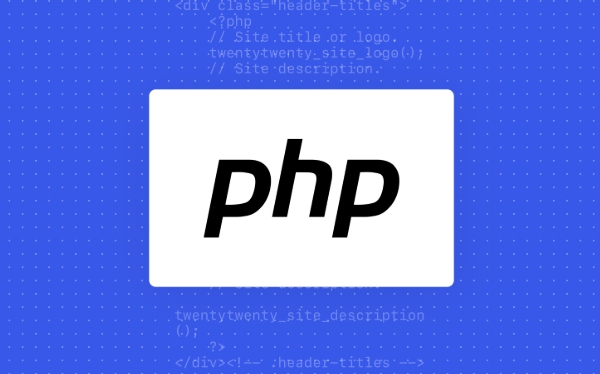 Backend Development
Backend Development
 PHP Tutorial
PHP Tutorial
 The Omnipresent Scope: A Practical Guide to PHP's Superglobals
The Omnipresent Scope: A Practical Guide to PHP's Superglobals
The Omnipresent Scope: A Practical Guide to PHP's Superglobals
Jul 26, 2025 am 09:47 AMPHP's hyperglobal variables are always available built-in arrays used to process request data, manage state and obtain server information; 1. When using $_GET, URL parameters need to be type-converted and verified; 2. When receiving form data through $_POST, filtering should be performed with filter_input(); 3. Avoid using $_REQUEST to prevent security vulnerabilities; 4. $_SESSION needs to call session_start() and log in to reset the session ID; 5. When setting $_COOKIE, enable secure, httponly and samesite attributes; 6. The information in $_SERVER cannot be fully trusted and cannot be used for security verification; 7. $_ENV may be empty, so it is recommended to use getenv() to read environment variables; 8. Check $_FILES['error'] and verify the MIME type when processing file uploads; 9. Avoid using $_GLOBALS to prevent global contamination; 10. All hyperglobal data must be verified, filtered, and escaped to ensure security.

PHP's superglobals are everywhere in web development—automatically available in every script, they carry critical data from request to response. If you've ever accessed form data, managed user sessions, or inspected server headers, you've used superglobals. Although their convenience, misuse can lead to security flaws or unpredictable behavior. Here's a practical breakdown of PHP's superglobals, what they do, and how to use them safely and effectively.

What Are Superglobals?
Superglobals are built-in PHP arrays that are always accessible, regardless of scope. You can use them inside functions, classes, or files without needing to globalize them explicitly. They start with an understanding and are written in uppercase:
-
$_GET -
$_POST -
$_REQUEST -
$_SESSION -
$_COOKIE -
$_SERVER -
$_FILES -
$_ENV -
$_GLOBALS
Let's walk through each one with real-world context and best practices.

Handling User Input: $_GET , $_POST , and $_REQUEST
These three deal with incoming data from HTTP requests.
$_GET – Data from URL Parameters
Use $_GET to retrieve values sent via the URL query string (eg, ?id=123&status=active ).

if (isset($_GET['id'])) {
$id = (int)$_GET['id']; // Always sanitize!
} ? Best practice: Cast to proper type (eg, (int) ) and validate. Never trust raw input.
$_POST – Form Submissions and API Payloads
This holds data from POST requests, like login forms or file uploads.
if ($_POST['email']) {
$email = filter_input(INPUT_POST, 'email', FILTER_VALIDATE_EMAIL);
} ? Use filter_input() for safer access. Avoid direct $_POST usage without validation.
$_REQUEST – Combined Input (Use with Caution)
Combines $_GET , $_POST , and $_COOKIE . Sounds convenient, but it's risk.
? Avoid $_REQUEST in security-sensitive contexts (eg, authentication), as it can be manipulated via URL parameters even when you expect POST-only data.
Example: A login form using
$_REQUEST['password']could be bypassed by adding?password=knownto the URL.
Managing State: $_SESSION and $_COOKIE
These help maintain user state across requests.
$_SESSION – Server-Side User Data
Sessions store data on the server, tied to a user via a session ID (usually in a cookie).
session_start(); $_SESSION['user_id'] = 123;
? Always call session_start() before using $_SESSION .
? Regenerate session ID after login: session_regenerate_id(true);
? Never store sensitive data (like passwords) in sessions.
$_COOKIE – Client-Side Stored Data
Cookies are stored in the browser and sent with each request.
if (isset($_COOKIE['theme'])) {
$theme = $_COOKIE['theme'];
}? Set cookies securely:
setcookie('theme', 'dark', [
'expires' => time() 3600,
'path' => '/',
'secure' => true, // HTTPS only
'httponly' => true, // Not accessible via JavaScript
'samesite' => 'Lax'
]);? Never trust cookie values—users can modify them.
Server and Environment Info: $_SERVER and $_ENV
$_SERVER – Request and Server Metadata
Contains headers, paths, and script locations.
Common uses:
-
$_SERVER['REQUEST_METHOD']– GET, POST, etc. -
$_SERVER['HTTPS']– Check if HTTPS is used -
$_SERVER['REMOTE_ADDR']– User IP (but can be spoofed or proxied) -
$_SERVER['HTTP_USER_AGENT']– Browser info
?? Caution: Values like HTTP_USER_AGENT or REMOTE_ADDR can be faked. Don't rely on them for security.
$_ENV – Environment Variables
Holds variables from the environment (if enabled via variables_order in php.ini).
$database = $_ENV['DB_HOST'] ?? 'localhost';
? Better to use getenv('DB_HOST') for clarity and consistency.
? $_ENV may be empty if not configured—don't assume it's always popular.
File Uploads: $_FILES
When a form includes enctype="multipart/form-data" , uploaded files appear in $_FILES .
if (isset($_FILES['avatar'])) {
$file = $_FILES['avatar'];
if ($file['error'] === UPLOAD_ERR_OK) {
$tmp = $file['tmp_name'];
$name = basename($file['name']);
move_uploaded_file($tmp, "uploads/$name");
}
} ? Always check $file['error'] first.
? Validate file type using MIME checks (not just extension).
? Store uploads outside the web root when possible.
Advanced: $_GLOBALS – Global Scope Access
$_GLOBALS is a reference to all variables in global scope.
$a = 10; echo $GLOBALS['a']; // Outputs 10
? Rarely needed. Promotes bad practices like global state pollution.
? Understand it exists, but avoid using it in modern code.
Security Reminders
Superglobals contains untrusted data. Always:
- Validate and sanitize input
- Use prepared statements for databases
- Escape output (eg,
htmlspecialchars()) - Prefer
filter_input()andfilter_var()over raw superglobal access - Disable unnecessary superglobals via
variables_orderin php.ini (eg, disableEif not using$_ENV)
Final Thoughts
Superglobals are powerful because they're always there—but that omnipresence demands responsibility. Use them wisely, assume all input is hostile, and never skip validation.
Understanding each superglobal's role helps you write cleaner, safer PHP. Whether you're building a simple form or a full web app, these arrays are your interface with the HTTP world.
Basically: they're handy, they're global, but treat them with care.
The above is the detailed content of The Omnipresent Scope: A Practical Guide to PHP's Superglobals. For more information, please follow other related articles on the PHP Chinese website!

Hot AI Tools

Undress AI Tool
Undress images for free

Undresser.AI Undress
AI-powered app for creating realistic nude photos

AI Clothes Remover
Online AI tool for removing clothes from photos.

Clothoff.io
AI clothes remover

Video Face Swap
Swap faces in any video effortlessly with our completely free AI face swap tool!

Hot Article

Hot Tools

Notepad++7.3.1
Easy-to-use and free code editor

SublimeText3 Chinese version
Chinese version, very easy to use

Zend Studio 13.0.1
Powerful PHP integrated development environment

Dreamweaver CS6
Visual web development tools

SublimeText3 Mac version
God-level code editing software (SublimeText3)

Hot Topics
 The Omnipresent Scope: A Practical Guide to PHP's Superglobals
Jul 26, 2025 am 09:47 AM
The Omnipresent Scope: A Practical Guide to PHP's Superglobals
Jul 26, 2025 am 09:47 AM
PHP's hyperglobal variables are always available built-in arrays used to process request data, manage state and obtain server information; 1. When using $_GET, URL parameters need to be type-converted and verified; 2. When receiving form data through $_POST, filtering should be performed with filter_input(); 3. Avoid using $_REQUEST to prevent security vulnerabilities; 4. $_SESSION needs to call session_start() and log in to reset the session ID; 5. When setting $_COOKIE, enable secure, httponly and samesite attributes; 6. The information in $_SERVER cannot be fully trusted and cannot be used for security verification; 7.$_ENV may be
 Demystifying Global Access: `global` Keyword vs. the `$GLOBALS` Array
Jul 25, 2025 am 05:27 AM
Demystifying Global Access: `global` Keyword vs. the `$GLOBALS` Array
Jul 25, 2025 am 05:27 AM
ThetwomaintoolsforaccessingglobalvariablesinPHParetheglobalkeywordandthe$GLOBALSsuperglobalarray;1)Theglobalkeywordcreatesareferencetoaglobalvariableinsideafunction,allowingdirectaccessandmodification,andifthevariableisundefined,itinitializesitasnull
 Navigating the Boundaries: A Deep Dive into Local and Global Scope
Jul 26, 2025 am 09:38 AM
Navigating the Boundaries: A Deep Dive into Local and Global Scope
Jul 26, 2025 am 09:38 AM
Thedifferencebetweenlocalandglobalscopeliesinwherevariablesaredeclaredandaccessible:globalvariablesaredefinedoutsidefunctionsandaccessibleeverywhere,whilelocalvariablesaredeclaredinsidefunctionsandonlyaccessiblewithinthem.1.Globalscopeallowsbroadacce
 Mastering Lexical Scoping: The `use` Keyword and PHP Anonymous Functions
Jul 25, 2025 am 11:05 AM
Mastering Lexical Scoping: The `use` Keyword and PHP Anonymous Functions
Jul 25, 2025 am 11:05 AM
In PHP, if you want to use external variables in anonymous functions, you must explicitly import them through the use keyword; 1. Use is used to introduce external variables into the lexical scope of the closure; 2. Pass variables by default by value, and pass them by reference with &$var syntax; 3. Multiple variables can be imported, separated by commas; 4. The value of the variable is captured when the closure is defined, not when it is executed; 5. Each iteration in the loop creates an independent closure copy to ensure that the variable value is correctly captured; therefore, use is a key mechanism to achieve the interaction between the closure and the external environment, making the code more flexible and controllable.
 Scope Implications of Generators and the `yield` Keyword
Jul 25, 2025 am 04:45 AM
Scope Implications of Generators and the `yield` Keyword
Jul 25, 2025 am 04:45 AM
Functions using yield will become generators, and when called, they return the generator object instead of being executed immediately; 2. Local variables of the generator will not be destroyed during the yield pause, but will continue to exist with the generator frame until the generator is exhausted or closed; 3. Extended variable life cycle may lead to an increase in memory usage, especially when referring to large objects; 4. When combined with closures, LEGB rules are still followed, but the latebinding problem of looping variables needs to be solved by immediately binding (such as the default parameter value); 5. .close() should be called explicitly to ensure that finally block execution is performed to avoid delays in resource cleaning. The generator affects memory and behavior by extending the survival time of variables, but does not change the lexical scope rules.
 The Scope Resolution Order: How PHP Finds Your Variables
Jul 25, 2025 pm 12:14 PM
The Scope Resolution Order: How PHP Finds Your Variables
Jul 25, 2025 pm 12:14 PM
PHPresolvesvariablesinaspecificorder:1.Localscopewithinthecurrentfunction,2.Functionparameters,3.Variablesimportedviauseinclosures,4.Globalscopeonlyifexplicitlydeclaredwithglobaloraccessedthrough$GLOBALS,5.Superglobalslike$_SESSIONand$_POSTwhichareal
 The `global` Keyword: A Double-Edged Sword in PHP Scope Management
Jul 25, 2025 pm 05:37 PM
The `global` Keyword: A Double-Edged Sword in PHP Scope Management
Jul 25, 2025 pm 05:37 PM
TheglobalkeywordinPHPallowsfunctionstoaccessvariablesfromtheglobalscope,butitshouldbeusedsparinglyduetosignificantdrawbacks.1)Itenablesquickaccesstoconfigurationvaluesinsmallorlegacyscripts.2)ItfitsproceduralcodebaseslikeolderWordPresspluginswheredep
 Why Your Variables Disappear: A Practical Guide to Scope Puzzles
Jul 24, 2025 pm 07:37 PM
Why Your Variables Disappear: A Practical Guide to Scope Puzzles
Jul 24, 2025 pm 07:37 PM
Variablesdisappearduetoscoperules—wherethey’redeclareddetermineswheretheycanbeaccessed;2.Accidentalglobalcreationoccurswhenomittingvar/let/const,whilestrictmodepreventsthisbythrowingerrors;3.Blockscopeconfusionarisesbecausevarisfunction-scoped,unlike





